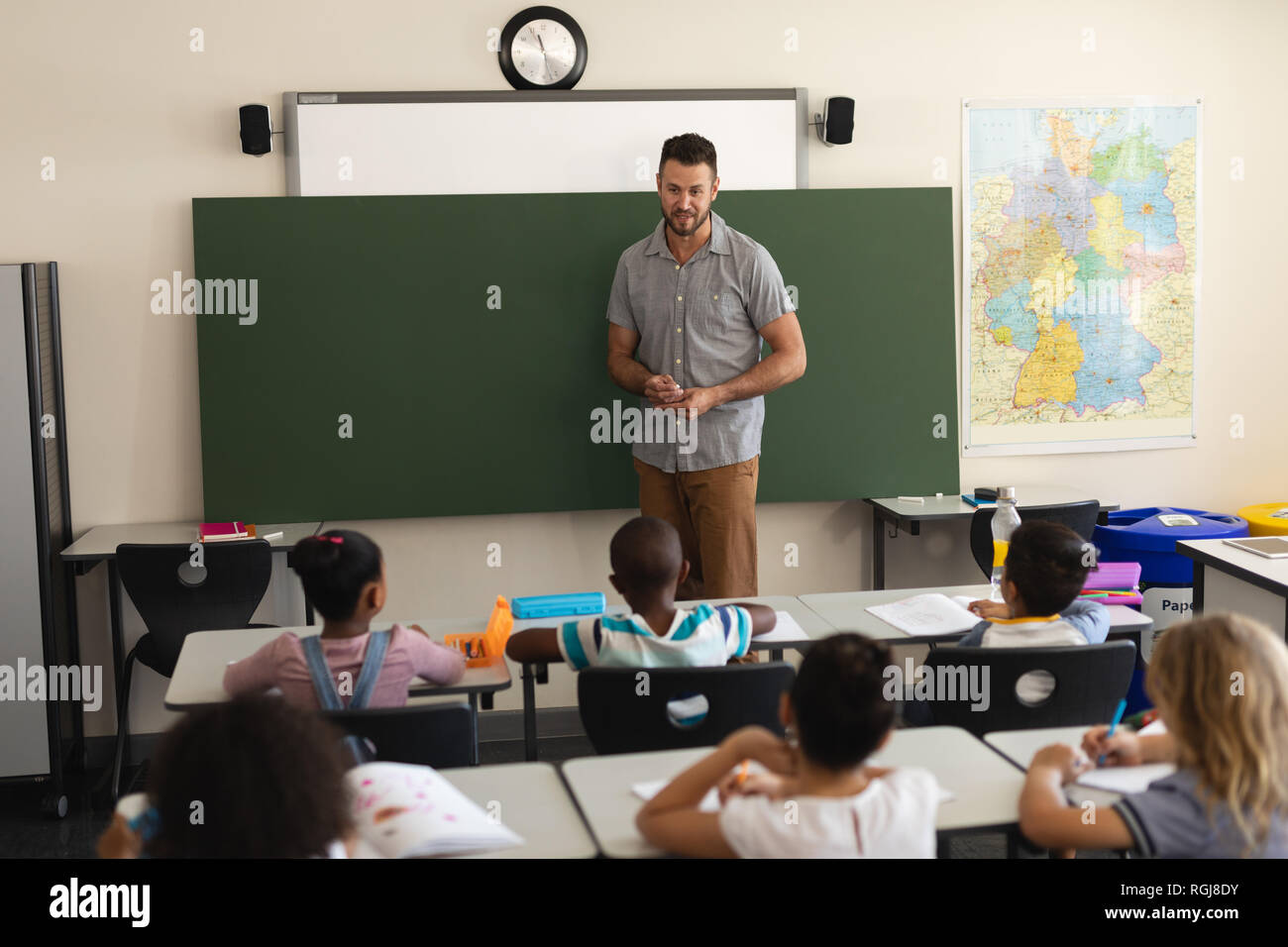Achieve Academic Success with Primary Science Tuition Singapore
A Comprehensive Guide to the Different Discovering Methods in Key Science Direction
The expedition of varied discovering techniques in main scientific research direction offers an opportunity for teachers to boost trainee engagement and understanding considerably. By analyzing hands-on learning techniques, inquiry-based approaches, and collaborative techniques, we can determine reliable practices that cater to numerous learning designs.

Hands-On Knowing Strategies
Hands-on discovering strategies play an essential duty in primary scientific research instruction, engaging pupils in energetic expedition and trial and error. These methods allow learners to connect straight with products and phenomena, promoting a deeper understanding of clinical concepts. By utilizing manipulatives, versions, and real-life experiments, instructors produce a setting where pupils can observe, assume, and check their concepts.
Such techniques not only boost comprehension yet likewise cultivate vital thinking and analytic abilities. When trainees take part in activities like building simple makers, planting seeds, or carrying out chain reactions, they are encouraged to ask concerns and look for responses with their very own observations. This experiential technique aids to demystify complex scientific principles, making them a lot more easily accessible and relatable.
In addition, hands-on learning advertises collaboration among peers, as pupils commonly function in groups to carry out experiments or share findings. This teamwork not just enhances their understanding experience yet likewise develops vital social abilities. Inevitably, incorporating hands-on strategies in main scientific research guideline fosters a lifelong love of knowing and inquisitiveness concerning the environment, laying a strong foundation for future scholastic pursuits in science and past.
Inquiry-Based Knowing
Inquiry-based discovering is an educational strategy that motivates trainees to ask inquiries, check out phenomena, and build their own understanding of clinical principles. This method shifts the focus from standard teacher-led instruction to an extra student-centered experience, where learners take the effort in their educational journey. By cultivating inquisitiveness, inquiry-based understanding promotes deeper engagement with the product, permitting students to explore subjects in a significant context.
In method, this method commonly includes hands-on experiments, observations, and important reasoning activities that line up closely with the scientific approach. Students are motivated to formulate hypotheses, layout examinations, and analyze data, which grows crucial abilities such as analytical and analytical thinking. The role of the educator in this framework is to facilitate expedition, leading pupils via the inquiry process while motivating independent thought and partnership.
Additionally, inquiry-based knowing supports a feeling of possession over the understanding process, motivating pupils to seek understanding actively. This approach not just boosts understanding of clinical principles yet also cultivates a lifelong love for learning, outfitting pupils with the abilities necessary to navigate a progressively complex world.
Collaborative Discovering Approaches
Joint discovering strategies empower trainees to involve in significant communications with peers, cultivating a shared responsibility for their educational end results. In primary scientific research instruction, these techniques encourage students to function with each other to check out scientific ideas, solve problems, and carry out experiments (primary science tuition Singapore). By joining team activities, trainees can utilize diverse viewpoints, permitting for richer understanding and retention of clinical knowledge
One key aspect go to this site of collaborative discovering is the focus on interaction skills. Students need to express their ideas, pay attention actively to others, and negotiate concepts, all of which are crucial expertises in both academic and real-world contexts. This social communication not only enhances their understanding of scientific principles yet also promotes teamwork and problem resolution skills.
When trainees see the worth of their payments within a team, they are extra likely to take ownership of their learning journey. Generally, incorporating collective knowing approaches in key scientific research guideline cultivates a dynamic understanding environment that prepares pupils for future academic and social challenges.
Technology Integration in Science
The integration of modern technology in primary scientific research guideline improves discovering experiences by offering innovative devices and sources that support different teaching methodologies, consisting of collaborative discovering - primary science tuition Singapore. Using electronic systems, simulations, and interactive applications allows trainees to engage deeply with scientific ideas, assisting in a much more hands-on method to discovering
Virtual research laboratories, for example, enable students to conduct experiments securely and successfully, advertising inquiry-based learning. These devices can replicate real-world scientific scenarios, enabling trainees to envision complex procedures that would be difficult to duplicate in a typical classroom setup. Moreover, innovation fosters communication and partnership amongst students, as they can share findings and function with each other on projects through on the internet platforms.
Furthermore, multimedia discussions and educational videos can improve lessons by providing to varied discovering styles, making abstract ideas a lot more obtainable. Information analysis tools additionally equip students to accumulate and analyze clinical data, enhancing critical assuming skills. Overall, the strategic incorporation of modern technology in primary scientific research instruction not just improves interaction but likewise prepares pupils for a technically innovative culture, equipping them with crucial abilities for future scientific endeavors.
Distinguished Instruction Strategies
Separated direction methods are important for attending to the varied demands of learners in primary science education. These approaches enable educators to the original source tailor their teaching techniques to accommodate differing capabilities, rate of interests, and finding out styles within the class. By utilizing set apart instruction, educators can create an inclusive atmosphere that cultivates engagement and improves understanding of clinical concepts.
One efficient approach is to use flexible organizing, which allows trainees to team up with peers at similar ability degrees or with varying viewpoints. This approach encourages peer understanding and advertises important thinking. Furthermore, supplying selections in projects can empower students, enabling them to select jobs that resonate with their passions while still satisfying curricular objectives.
Moreover, including tiered projects is one more important method. Deliberately jobs with differing levels of intricacy, teachers can make sure that all pupils are suitably tested, despite their efficiency. Using developmental assessments to evaluate comprehending more makes it possible for educators to readjust their training approaches dynamically, making certain that each student obtains the assistance they require.
Ultimately, applying separated guideline approaches in primary science education and learning not only improves student see it here understanding end results however additionally cultivates a passion for science, preparing students for future scholastic quests.

Verdict
In recap, efficient main science instruction necessitates a multifaceted strategy that includes hands-on discovering, inquiry-based approaches, and collaborative methods. The combination of innovation and separated guideline additionally provides to diverse understanding designs, promoting an environment helpful to exploration and vital reasoning.
The expedition of diverse discovering approaches in main science instruction offers a chance for instructors to improve pupil engagement and understanding considerably.Hands-on discovering strategies play an essential role in key scientific research direction, involving trainees in energetic expedition and experimentation.Inquiry-based understanding is a training approach that encourages trainees to ask inquiries, explore sensations, and create their very own understanding of scientific ideas.Collaborative knowing techniques encourage pupils to involve in meaningful interactions with peers, fostering a common responsibility for their academic end results. On the whole, including collaborative knowing strategies in key scientific research guideline cultivates a dynamic learning setting that prepares pupils for future scholastic and social obstacles.